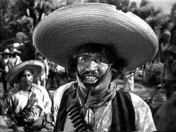|
Ricardo -> RE: When Kate's away, the mice will play... (Dec. 13 2007 16:07:28)
|
quote:
So, if your going to say that tango is flamenco, then so is rumba. Unless of course it is performed by someone who doesn't give it the aire. As opposed to sevillanas, which is never flamenco, even when sung by Camaron. Clear as mud.
In the movie "sevillanas" by Saura, the point was to show many different groups performing Sevillanas, including the "flamencos" and the "gitanos". I think it is a taste issue if you want to claim Rumbas by camaron are flamenco, but his sevillanas are not. My point is that they are both in the "ify" category along with fandangos, Villancicos, etc. Point being the "aire" issue. Rumberos do rumba with the right "aire" for sure, but are not flamencos. That is why I would put them in the same group with folks that only do Sevillanas. I don't consider Tangos and Rumba to have the same compas feeling. Tangos for sure is more "flamenco" than rumba.
As far as PDL doing jazz standard, OK. But what about Juan Serrano's "autum leaves"? It was for sure a bulerias, he just made it flamenco. So again, the interpreter is the thing that will make it flamenco or not...and what makes something flamenco or not depends once again on taste.[;)] But you don't usually find people who ONLY DO Solea, or siguiriyas, or bulerias (all with proper aire), that are considered NOT flamencos. Personally I say, yes Ottmar plays bulerias and that IS flamenco. It is just that it is "bad". Gipsy Kings play good rumba, but it is not flamenco. Some use the term "flamenco" not to categorize music, but to say something about the taste of the music, and that confuses things (like you seem to think if the "aire" is not there, it is not a flamenco form?). We all draw our own lines when it comes to taste. My earlier comments trying to explain why Sevillanas or Rumba may not be considered flamenco, are ignoring the taste thing.
quote:
I don't know what the Rito is that you refer to
I mean RITO Y GEOGRAFIA DEL CANTE FLAMENCO. The other series mentioned, Baile and Toque, actually are mixed programs pulled from spanish tv including parts of the Rito program regarding cante. The Cante program only is what I was refering to and recommed for those interested in these topics regarding cante evolutions, definitions, categories, terminology, etc. The latest versions are really cleaned up DVD picture and audio, with subtitles and booklets that give even more trivia.
quote:
Oops. I concede. You know more than me. Forget Pedro who has played for Mario Maya, Sara Lezana, Guito and a long list of others. Forget Chus, born in Almeria, raised in Granada, studied with many greats in Granada and abroad and still accompanies or has accompanied some of the greats on occasion including Yerbabuena. They are mere mortals.
I want to study with you .
Whatever man. Sorry I tried to help.
Oh yeah, and after all my blabbing about fandangos, I forgot that the most common term used for the free style flandangos with no compas is not "personales" actually, they use the term "naturales" usually. But Rito does not even use the term "naturales" except in passing. They were bent on the point about personal creations based on the structure formed in Huelva.
So, not like anyone cares at this point, it is still interesting to me. Time to put "fandango grande" to bed...and me too.
Ricardo
|
|
|
|

